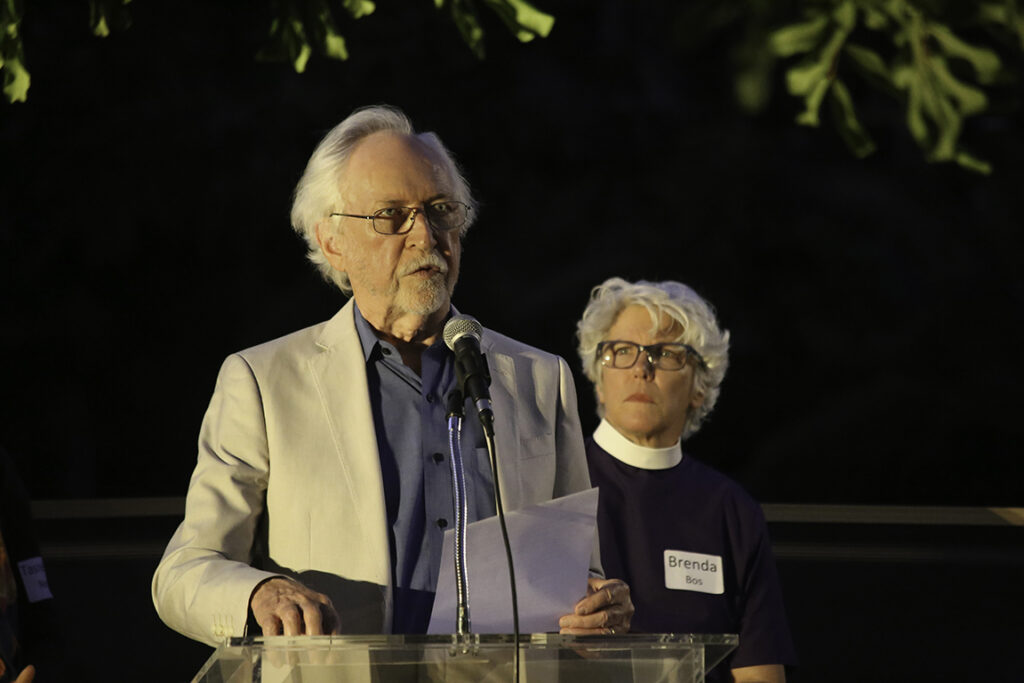
Author Jack Miles delivers remarks on his book “God in the Qur’an” at the episcopal residence on Sept. 10 as Bishop Brenda Bos (ELCA) listens. Photo: Janet Kawamoto
The Episcopal Church is positioned to help bring together a polarized nation by being an authentic spiritual home for its adherents and also maintaining an open door to other faith traditions in order to heal division and suspicion, Jack Miles – Pulitzer Prize-winning writer and author of God: A Biography and God in the Qur’an – told a gathering at the episcopal residence as the nation prepared to mark the 20th anniversary of the 9/11/2001 terrorist attacks.
About three dozen Episcopalians and others involved in the Diocese of Los Angeles’ capital campaign, themed “Everlasting Transformation,” attended the event, hosted by Bishop John Harvey Taylor and his spouse, Canon Kathy O’Connor.
Miles keynoted the program, which also featured remarks from the Rev. Brenda Bos, new bishop of the Southwest California Synod of the Evangelical Lutheran Church of America, and Tasneem Noor, member of the Islamic Center of Southern California and an interfaith minister for the Diocese of Los Angeles. Interim Dean Gary Hall of Bloy House (Episcopal School of Theology, Los Angeles) moderated the discussion.
A video of the full program is here.
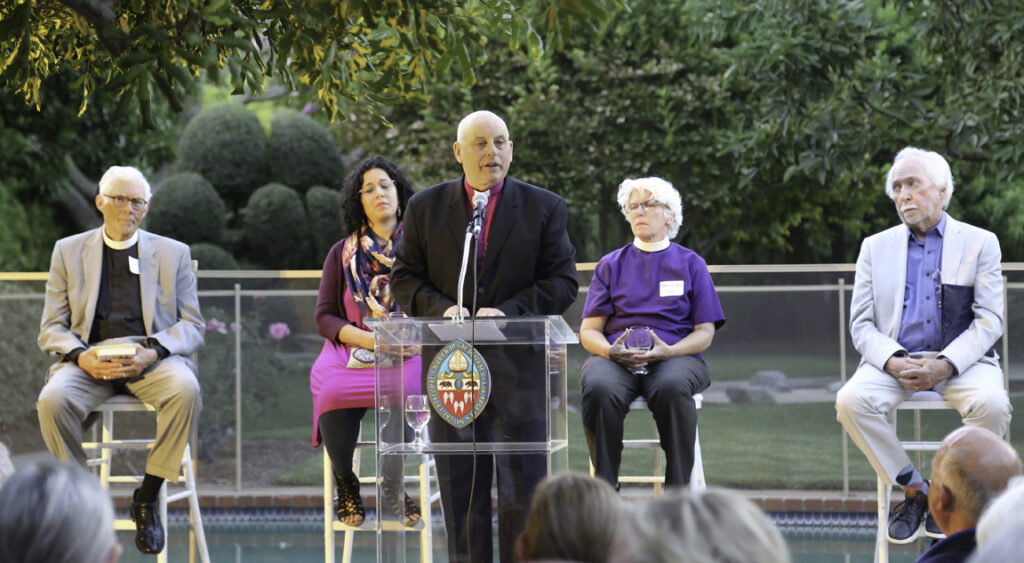
Bishop John Harvey Taylor delivers introductory remarks before the panel begins its presentations. Photo: Janet Kawamoto
Memories of Sept. 11, 2001, and the Jan. 6, 2021, attack on the U.S. Capitol framed the evening’s events, beginning with a prayer by Canon to the Ordinary Melissa McCarthy and continuing with opening remarks by Taylor.
“The late Phyllis Tickle, a beloved Episcopal writer and preacher, used to say that we followers of the risen Christ … get a reformation every 500 years whether we want one or not,” Taylor said. “In the post-Sept. 11 world and the post-Jan. 6 world, in a secularizing yet spiritually famished world we need a reformation now more than ever. Not a Christian reformation necessarily; a reformation that unites all faithful people who are devoted to the self-sacrificial service and care of others, and who believe with us that the God of love is with us in this for the long haul.”
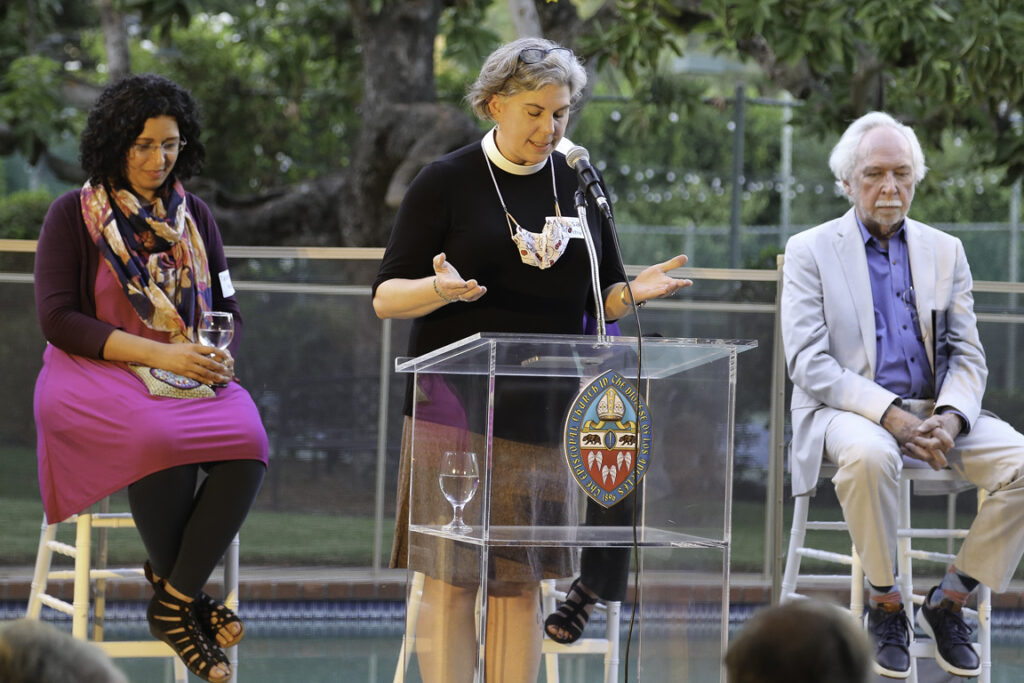
Canon to the Ordinary Melissa McCarthy gives the opening prayer at the Sept. 10 event at the episcopal residence. Photo: Janet Kawamoto
Miles, a retired professor of religion at the University of California at Irvine and editor of the Norton Anthology of World Religions, described to the gathering the process of writing God in the Qur’an.
After publication of his 1996 Pulitzer-winning God: A Biography and 2002 Christ: A Crisis in the Life of God (published soon after the 2001 attacks), Miles’ editor at Alfred A. Knopf suggested that he continue his explorations with a book on the Qur’an, the holy scripture of Islam.
Miles said he declined the suggestion. “After all, I had only a smattering of Arabic,” he said. “I had made no serious study of the Qur’an beyond what I had learned in order to teach courses in world religions.”
But the thought stayed with him, he said, and 17 years later, “I hit on a way to do a modest, intentionally limited book on the Qur’an – specifically, a book that would confine itself to those parts of the Qur’an that recall or rehearse iconic episodes from the Bible. A book written in this way, I reasoned, could compare the Qur’anic with the biblical treatment of these episodes and could focus throughout on something rarely examined – namely, how God, the central character in both scriptures, presents or reveals himself in these episodes.” He hoped that such a book would give Christians and Jews insights into Islam, and perhaps inspire “at least a few” Muslims to explore the Bible.
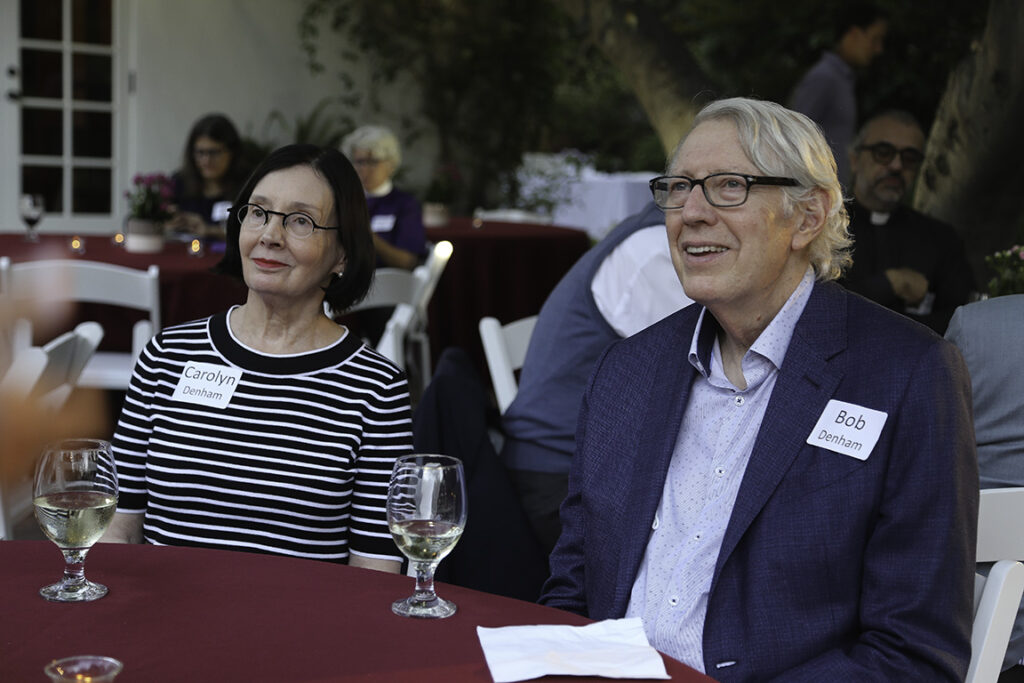
Carolyn and Bob Denham enjoy Jack Miles’ presentation at the Sept. 10 gathering.
For his presentation, Miles shared three episodes that are treated in both the Qur’an and the Bible: the stories of Adam and Eve, of Cain and Abel, and of Moses and Pharoah.
But before launching into the three tales, Miles addressed the question of violence in both scriptures, as expressed in the foreword to his book.
“In the long, terrorizing aftermath of 9/11,” he said, “I thought I had to address this issue for my American readers before I could expect them to listen with open ears to anything else that I had to say about the Qur’an. The point I made in this foreword, however, was that it does not follow from the presence of violence in a scripture that we must fear violence on the part of those who read the scripture. If this were the case, I argued, then we Christians would have to fear one another as much as we fear Al Qaeda. … Let us then, as Jews and Christians, I pleaded, extend the same courtesy, the same trust, the same indulgence, to the Muslims among us that we extend to ourselves.”
In the Adam and Eve story as told in the Qur’an, Miles said, Allah (God) allows the the rebel angel Iblis, newly banished from heaven, to tempt his new human creations into disobedience. Adam and his unnamed wife are warned that Iblis will attempt to corrupt them, but despite this advance knowledge they eat fruit of the forbidden tree. When confronted, however, they both repent and Allah forgives them at once, although he punishes them by sending them away from Eden into an ordinary earthly environment, promising them an afterlife in Paradise if they live in submission to him.
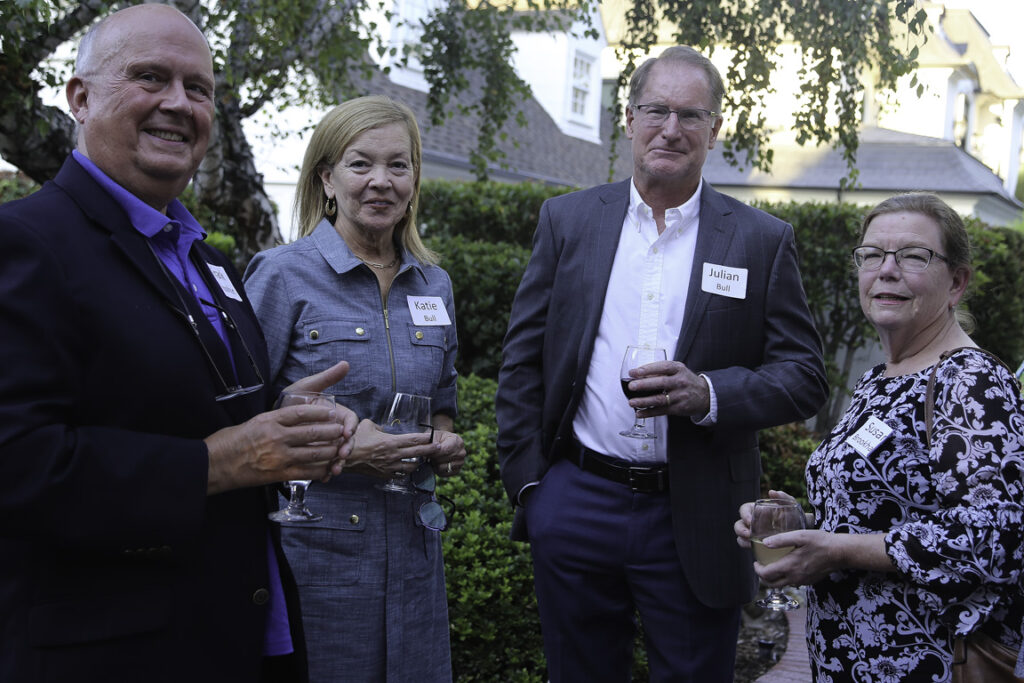
Bishop Frank Brookhart, Katie Bull, Julian Bull and Susan Brookhart enjoy the reception before Jack Miles’ Sept. 10 presentation. Photo: Janet Kawamoto
Miles compares this telling to the version in the Hebrew and Christian scripture, in which Yahweh (God) does not warn Adam and Eve that a snaky tempter will be after them and is furiously angry when they disobey his command and then make excuses.
“Yahweh is aflame with fury; it is far from unclear that even repentance would pacify him,” said Miles. “He expels the two sinful humans from the Garden of Eden, blighting the woman’s sexuality and the man’s labor, condemning them and their offspring for all time to capital punishment, and making no mention of any afterlife. Their paradise has been utterly lost, and thousands of years will pass before it is regained for them, but they are not allowed to know even this.”
Referring to John Milton’s poem Paradise Lost, in which Michael the Archangel consoles the evicted couple and promises that God eventually will make all right with his plan for universal redemption, Miles suggested that a reader might see the Qur’an’s version as a similar revision of the tale – even a correction.
“If we do that, what difference do we notice in, respectively, the two self-characterizations of God?” asked Miles. “Might we go so far as to say that Allah shows himself to be, if not by the end of the two scriptures more merciful than Yahweh, then at least at the start more swiftly merciful?”
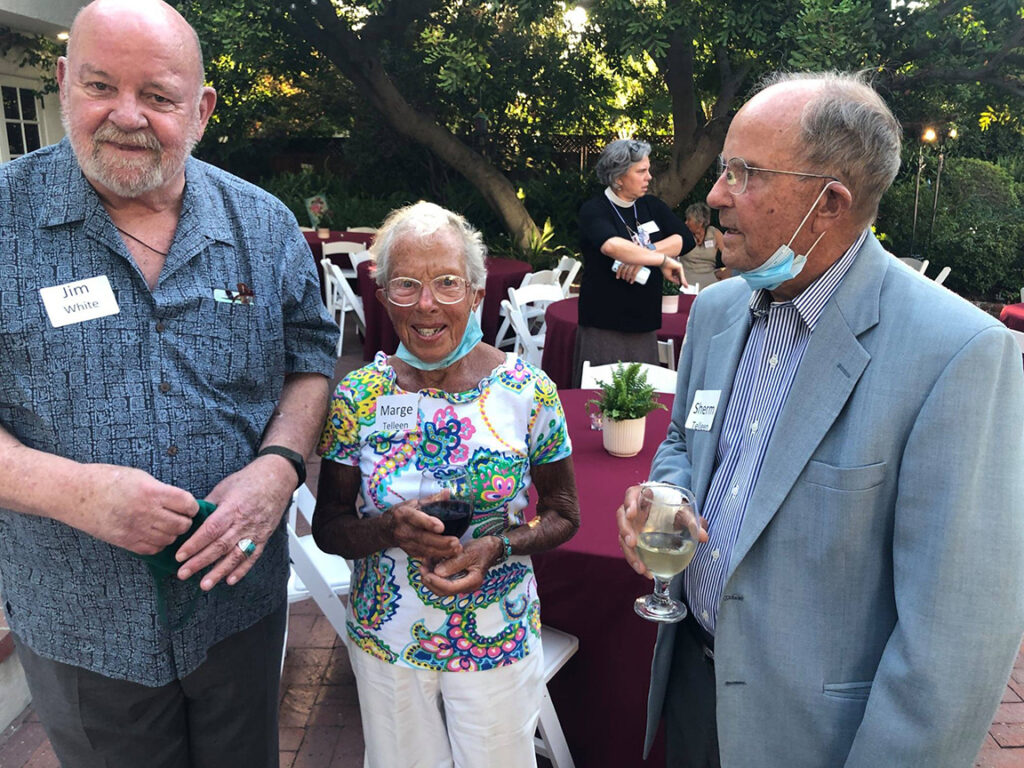
Canon Jim White chats with Marge and Sherm Telleen before the panel discussion. Photo: John Taylor
Miles outlined similar themes of mercy in the Qur’anic version of the story of Cain and Abel, in which Abel is given a voice to express his obedience to Allah. Cain, after he murders his brother, is reminded to bury Abel’s body respectfully and expresses remorse for his deed, in contrast to his arrogance (“Am I my brother’s keeper?”) and lack of self-accountability in the Bible.
In similar fashion, Miles said, in the story of Moses and Pharoah in the Bible, Moses’ commission is to free Israel but also to humiliate Pharoah and all of Egypt with the 10 plagues. In the Qur’an Allah commands Moses to free the people of Israel but also to convert Pharoah to the worship of Allah. The Qur’an version eliminates the ten plagues and the consequent suffering of the Egyptian people. Pharoah is drowned in the closing of the Red Sea, but surfaces long enough to repent and accept Allah as his god.
“In Exodus, Yahweh seems to take considerable pleasure in the death of the wicked,” said Miles, “and so do the Israelites, who at Exodus 15 sing a song of jubilation at the drowning of Pharaoh’s army. So, in sum, Yahweh wants to defeat Pharaoh, not convert him; Allah wants to convert him, not defeat him: a clear difference.”
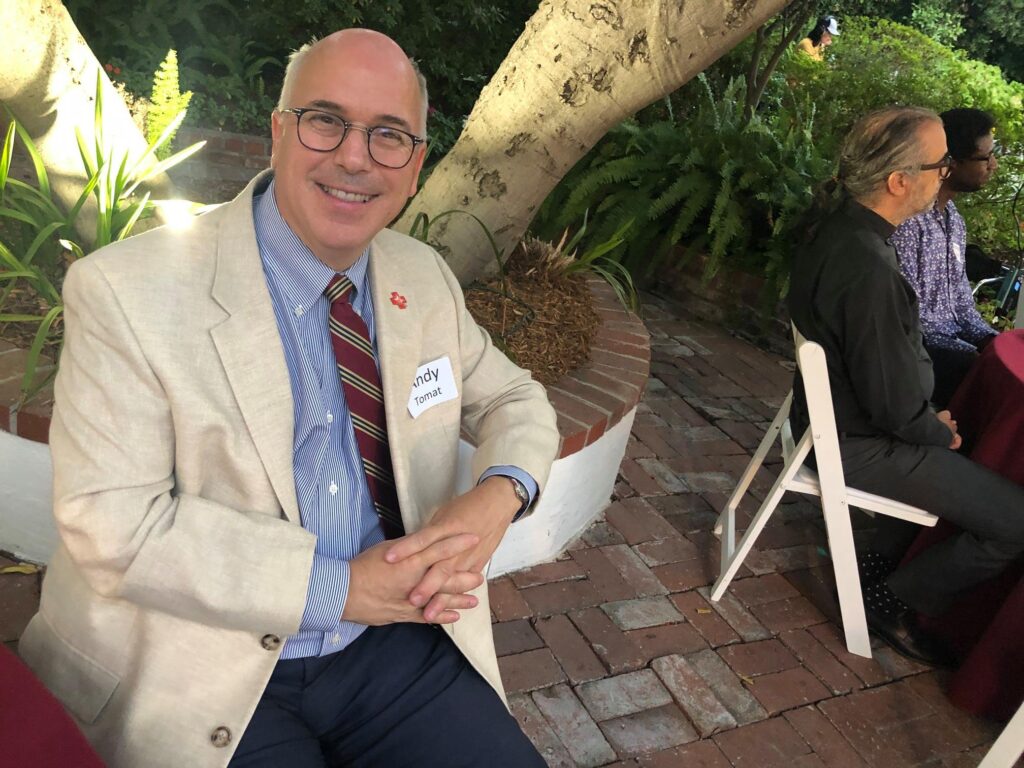
Diocesan treasurer Andy Tomat is pictured at the episcopal residence during the Sept. 10 gathering. Photo: John Taylor
Miles asked his listeners to try to see God through the lens of the Qur’an. “I hope only that by exercising your imagination just this much, you may find it a little easier to trust the Muslim next door, thinking of him as someone whose religion, after all, may not be so wildly unreasonable that someone holding to it could not be a trusted friend. Taking a further hopeful step, you might imagine that very Muslim neighbor returning the favor and imagining his way into your mind, your guiding texts, and your religious or irreligious life as you have imagined your way into his.”
Miles concluded: “If our Episcopal Church has a mission in the furiously embattled America where we find ourselves today, I believe it is to model for our countrymen a faith community that is our authentic spiritual home – both genuinely spiritual and authentically embraced and supported as our home – and yet that is a home with doors kept far enough ajar that we can see out to other homes and others can see in to ours.
“If we can cultivate in our church habits of openness, trust, mutual support to be sure, but also sympathetic participation in the lives and faith commitments of others, then our country will be just that little bit better defended, culturally, against descending irreversibly into an abyss of suspicion, hatred, and crippling division.”
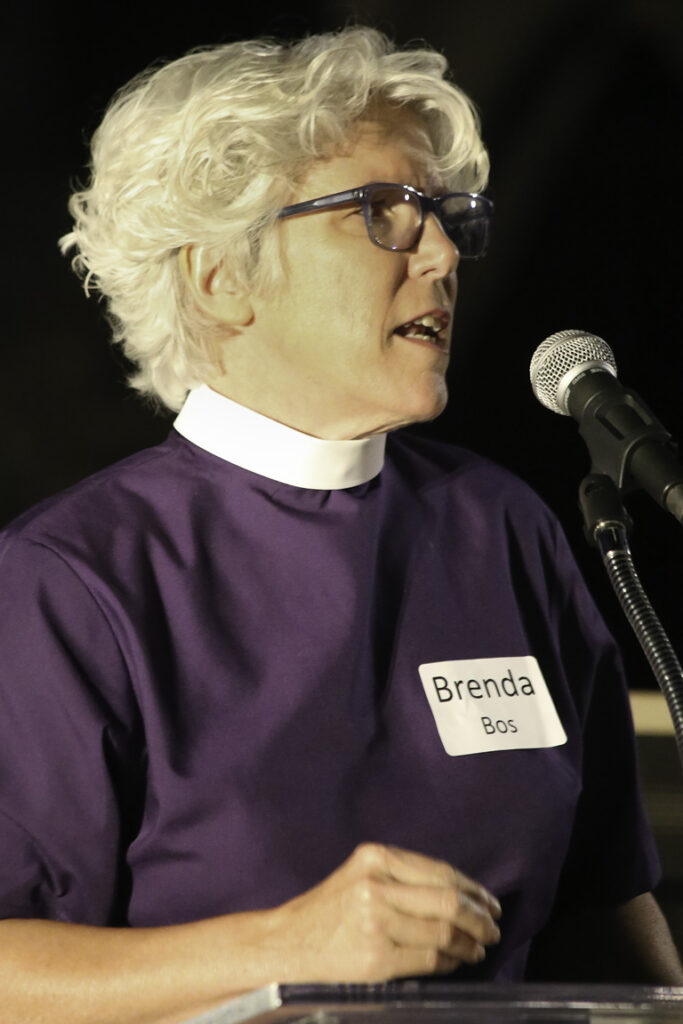
Brenda Bos delivers remarks at the Sept. 10 event. She was installed as bishop of Southwest California Synod of the Evangelical Lutheran Church of America two days later, on Sept. 12. Photo: Janet Kawamoto
Bishop Bos echoed Miles’ call for openness to other faith traditions, even if it makes one uncomfortable. “Dr. John Cobb, who had been a longtime theologian at Claremont School of Theology, said, ‘To do interfaith dialogue is to cross a bridge and be willing to not turn back around,” she said. “Well, that seems so frightening. What if I change? That’s completely the idea. What image of God are you following? A vindictive, jealous god? Or one who is open and loving and inviting new things?”
“But I want to take it one further. Not only should we be open and compassionate and welcoming; we should move forward to service, to love, to social justice,” said Bos, who was ordained and installed as a bishop on Sept. 12. “I think that interfaith dialogue is an important thing. Thank God that we are doing it. But I think that the world of violence and hate will be changed when people of faith from all traditions start to love each other; start to care for each other, start to have self-sacrificing acts of service, start to move into social justice together. Because then we can agree that the God we are following is magnanimous, is generous, wishes to love. … And following that God calls us to love. Radical, courageous, self-sacrificing love. And I believe that in this time and place we can change the world with that counter-cultural response to all that is difficult and hard in this world.”
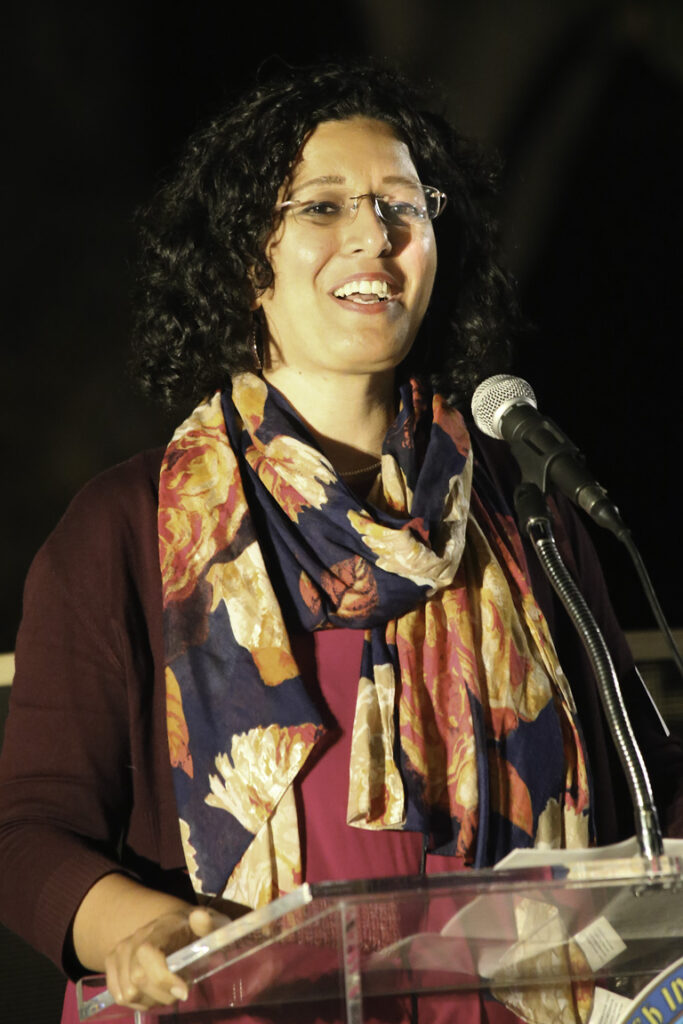
Tasneem Noor, leader in the Muslim community, responds to Jack Miles’ presentation on Sept. 10. Photo: Janet Kawamoto
Tasneem Noor, who grew up in India and Pakistan and came to the United States and a teen, praised Miles’ book and his presentation as “a careful, honest examination of the differences on how God and the various other characters are depicted in the Qur’an.”
“I’m really drawn, in my core, to this invitation in the Qur’an (49:13,” she said. “It says, ‘O mankind! Lo! We have created you, male and female, and have made you nations and tribes so that ye may know one another. Lo! the noblest of you, in the sight of Allah, is the best in conduct/most righteous/God conscious.’ (There are a lot of different ways that one word is interpreted.) I’m just so curious – what is that intention, what is that magic or transformation when we truly get to know one another instead of pushing the other aside?”
Like Miles, Noor was intrigued as a student when she read Paradise Lost and its detailed account of the fall of man in Eden. But she questioned the role played by Eve; “how can Eve be blamed for all of it?” Noor asked. She wondered how Christian women feel when they read this story.
Among the lessons she took from the Qur’anic Adam and Eve narrative, she said, was that God plays no favorites, and that everyone is accountable for his or her actions and must accept the consequences. “The last message that I got was that God’s mercy and love is greater than his wrath and sometimes even his justice,” Noor said.
“I feel empowered to be a woman because I’m Muslim. I’m very clear about that.” Women, she said, have a special regard in Islam and in the writings of the Prophet Mohammed.
But the use of her religion as an excuse for oppression and harm to others, especially to women – leading to an assumption among Christians and others that Islam is a religion of violence, terror and misogyny – is painful to her, she said.
She was a high school student when the planes hit the World Trade Center.
“It definitely was a life-changing moment because I had to answer for myself what it meant to be Muslim,” she said. “And I know that whatever you felt that day or witnessed – the anguish and the fear and the anger and the frustration – I and my Muslim family and friends felt that heartbreak, because it was our religion, my religion, that was being hijacked, and I just couldn’t understand. I couldn’t wrap my head around it. … And it hurt.”
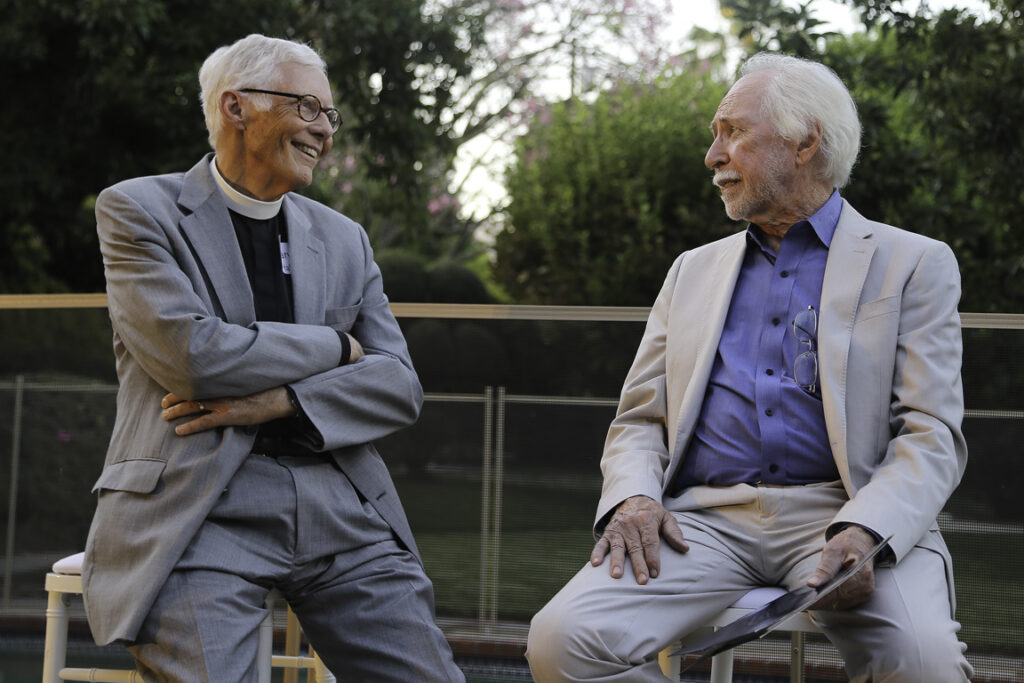
Dean Gary Hall of Bloy House and keynoter Jack Miles confer before their presentation at the episcopal residence on Sept. 10. Photo: Janet Kawamoto
As she matured, Noor said, she began to overcome her fear of questioning the Qur’an and the tenets of Islam. Part of her journey was hearing a discussion in which a group of Jews talked about wrestling with God and stated that God makes mistakes. She was shocked until one of the Jewish group reassured her and other Muslim participants that their questioning took nothing from God’s glory. “It is like a parent-child relationship,” he explained. “You love your parents, you accept their authority and acknowledge their love; but you still question them, you still disagree with them.”
“I was just blown away,” said Noor. “It was a mic drop moment for me.” Her continuing dialogue with Christian and Jewish friends, she said, has helped build her capacity to engage with her faith more fully and authentically.
“There are some serious problems in the world, and it’s important to call out the injustice, it’s important to call out the lies, it’s important to call out the violence, it’s important to hold others accountable and ourselves accountable so we’re living up to the standard that we want others [to observe],” she said.
“But how? How do we do it in a way where we can criticize the terrorists, the Taliban, the white Christian nationalists and call them out without making it a Christian thing, without making it a Muslim thing? I’m very sensitive right now to how the Christians are being portrayed, as a white nationalist Christian narrative, because I see the Muslims in that. I’ve been on the receiving end of it, and I don’t want my Christian community and my friends to face that sense of being clumped together and being just seen as one or the other. Because there’s such richness.
She concluded, “How can we hold our own truth with compassion, be curious with the other, and still make room for accountability and social justice in our lives?”
